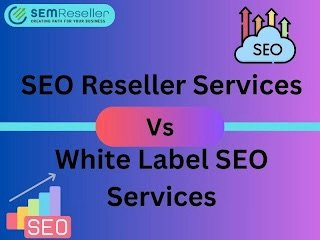In the fast-paced world of digital marketing, businesses are constantly seeking effective strategies to boost their online presence and reach their target audience. Among the myriad of techniques available, Search Engine Optimization (SEO) stands out as a fundamental pillar for enhancing visibility and driving organic traffic to websites. However, not all businesses possess the expertise or resources to execute SEO strategies internally. This is where SEO reseller services and white-label SEO services come into play, offering alternative approaches to outsourcing SEO needs. Let’s delve into the comparison between these two options to understand their differences and benefits.
Understanding SEO Reseller Services:
SEO reseller services involve a partnership between an SEO agency and a third-party entity, typically a marketing agency or freelancer. In this model, the SEO reseller acts as an intermediary between the client and the SEO provider, offering SEO services under their brand name. The SEO reseller is responsible for client communication, project management, and often, customer support.
One of the primary advantages of SEO reseller services is the opportunity for marketing agencies to expand their service offerings without investing in additional resources or expertise. By partnering with an established SEO provider, they can leverage the skills and experience of professionals in the field, offering comprehensive SEO solutions to their clients.
Moreover, SEO reseller services allow agencies to maintain their brand identity and reputation while outsourcing the technical aspects of SEO. This enables them to focus on their core competencies and client relationships without worrying about the intricacies of search engine optimization.
Exploring White Label SEO Services:
White-label SEO services, on the other hand, involve a similar partnership structure but with a key distinction. In this model, the SEO provider remains behind the scenes, offering their services directly to the reseller, who then rebrands and resells them as their own. Essentially, the reseller acts as a front-facing entity, while the actual SEO work is conducted by the white label provider.
One of the main benefits of white-label SEO services is the flexibility and scalability they offer to resellers. Since the SEO provider handles the execution of strategies and deliverables, resellers can focus on acquiring clients and growing their business without being bogged down by the operational aspects of SEO.
Additionally, white-label SEO services provide resellers with the opportunity to offer specialized expertise and high-quality services without investing in in-house talent or training. This allows them to cater to a broader range of client needs and maintain a competitive edge in the market.
Key Differences and Considerations:
While both SEO reseller services and white-label SEO services offer valuable solutions for businesses looking to outsource their SEO requirements, there are notable differences between the two approaches.
- Brand Visibility: With SEO reseller services, the reseller’s brand is prominently featured in client communication and deliverables, whereas white-label SEO services prioritize the reseller’s branding, with the SEO provider operating discreetly in the background.
- Client Relationships: SEO reseller services involve direct interaction between the client and the reseller, fostering a closer relationship and greater transparency. In contrast, white-label SEO services may create a perceived distance between the client and the actual service provider.
- Control and Customization: While both models offer varying degrees of customization, SEO reseller services may provide more flexibility in tailoring solutions to meet specific client requirements, given the direct communication between the reseller and the client.
Final Thoughts
So, there you have it! Remember that the choice between SEO reseller services and white label SEO services ultimately depends on the preferences and priorities of the reseller, as well as the needs of their clients. Whether seeking to expand service offerings, enhance brand reputation, or streamline operations, both models offer distinct advantages for businesses looking to harness the power of SEO in their digital marketing strategies. By understanding the differences and considerations associated with each approach, resellers can make informed decisions that align with their goals and objectives.



